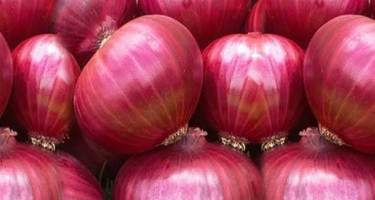Onion - WDRA
Onion
Commodity Code - 23
Commodity Name - Onion(Fresh or Dehydrated)
Commodity Scientific Name - Allium cepa (L)

EARLY GRANO, NIPHAD-53, PATNA RED, PUSA WHITE FLAT, PUSA WHITE ROUND, RED GLOBE, 1068, 1069 (OP), 827, Black Gold, BSS-226, bss- 41, Cammandar, Choice red, Delhi Ball 65, Dr-5, Fursungi, Gavran, Gulmohar, Hare Krishna, Indian Grano, jyoti red, Kadam, Kasturi F1, King of King Cross, Kirti, Kohinoor-9, Kumud, LR-10, lucifer, Mahadev, mahi, mallika, Maya, N 53, N-50, N-53, Narayan(Light Red), Nasik Red, Nasiklal, NO-1067, Orient, Paras, Red, Red Diamond, Rosita, Rosy-1, 2, 3, 4, Snow, Snow White, Sofia, Solid, Swetha-1, 2, Tanzanian Rad, Topaz, Udita , White Marglobe, ARKA KALYAN, ARKA NIKETAN, ARKA PRAGATI, PUNJAB SELECTION, HISSAR-2, PUSA RATNAR, PUSA RED, PUNJAB-48, CO. 2, V.L. PIAZE-67, CO. 3, MDU-1, KALYANPUR RED ROUND, C.O. 4, AGRI FOUND DARK RED, BASWANT (NO.780), PUSA MADHVI, VL PIAZ-3, AGRI. FOUND LIGHT RED, PUNJAB NAROYA, PUNJAB WHITE, PHULE SUVARNA (RHR-87015), RO-1 (Rajasthan Onion-1), Aprita (RO-59), Arka Bindu, Arka Pitambar, NHRDF RED, Akola Safed (PKV Selection white), Phule Samarth (S-1), Bhima Raj (B-780-5-2-2), Hisar Onion-3 (HOS-1), NHRDF RED 2 (L 355), PUSA RIDHI, Bhima Red, Bhima Super, Bhima Shakti, Bhima Shweta, N¬2¬4¬1
| Grade Designation | Grade Requirements | Grade Tolerances |
| 1 | 2 | 3 |
| Extra class | Onion shall be of superior quality.They shall be characteristic of the variety and /or commercial type. The bulbs shall be :
| 5% by number or weight of onion not satisfying the requirements of the grade, but meeting those of Class I grade or, exceptionally, coming within the tolerances of that grade. |
| Class I | Onion shall be of good quality.They shall be characteristics of the variety and/or commercial type. The bulbs shall be :
| 10% by number or weight of onion not satisfying the requirements of the grade, but meeting those of Class II grade or, exceptionally, coming within the tolerances of that grade. |
| Class II | Onion which do not qualify for inclusion in the higher grade, but satisfy the minimum requirements.They shall be reasonably firm. The following defects may be allowed, provided the onion retain their essential characteristics as regards the quality, the keeping quality and presentation.
| 10% by number or weight of onion not satisfying the requirements for the grade but meeting the minimum requirements. |
Other Requirements
-
The development and condition of the onion must be such as to enable them to
- withstand transport and handling, and
- arrive in satisfactory condition at the place of destination.
-
Onions must be presented as follows
- arranged in layers
- loose in the package (including in bulk bins)
- in strings
- either of a certain number of bulbs, in which case the strings must contain at least six onions(with fully dried stems); or of a certain net weight.
- For stringed onions, the characteristics of the strings in any one package(number of bulbs or net weight) must be uniform.
PROVISIONS CONCERNING SIZING
- Size is determined by the maximum diameter of the equatorial section in accordance with the following table
Size code Diameter (in mm.) Difference between the diameter of the smallest and largest onion in the same package (in mm) 5 A 10-20 15 B 21-40 20 C 41-70 30 D 71 and Above The minimum diameter is 10mm.
- Size tolerances: For all grades, 10% by weight of onions not satisfying the size identified, but with a diameter of no more than 20% below or above it.
General Characteristics
-
Onion shall be
- intact
- sound, produce affected by rotting or deterioration such as to make it unfit for consumption is excluded
- clean, free from any visible foreign matter,
- free from damage caused by frost
- sufficiently dry for the intended use(in the case of onions for storing, at least the two first outer skins and the stem must be fully dried)
- without hollow or tough stems
- practically free from pests
- practically free from damage caused by pests
- free of all abnormal external moisture
- free of any foreign smell and/or taste
-
They shall comply with the residue level of heavy metals, pesticides and other food safety parameters as laid down by the Codex Alimentarius Commission for exports.
Onion shall be
-
Dry, intact, clean, of reasonably uniform size, & shape, color characteristic to the variety
-
Free from sprouting, seed stem, double split, staining, insect infestation, soft root.
Criteria for Range designation
| S.no. | Tradable parameters | Range-1 | Range-2 | Range-3 |
| A | Essential | |||
| i | Defects(% by count) (Max)(i) Cut(5-15mm long) | 5.0 | 10.0 | 15.0 |
| (ii) Double split | 2.0 | 5.0 | Above 8.0 | |
| (iii) Sprouted | 2.0 | 5.0 | Above 8.0 | |
| (iv) Rooting | 2.0 | 5.0 | Above 8.0 | |
| ii | Size (maximum diameter of the equatorial section) | Up to 65 mm | Up to 45mm | Up to 25 mm |
| B | Optional (Industrial/Processors) | |||
| i | Color (%) (Characteristic true to the variety) Scale (1 to 100*) /Visual (*100% is true to variety colour) | More than 70 | Between 40-70 | Less than 40 |
Sampling
-
5 % or minimum one container shall be randomly selected for sampling.
-
500g shall be drawn from each selected container and shall be mixed homogenously, called as primary sample
-
500g shall be drawn from primary sample called as Laboratory sample.
Optional parameters are voluntary and may be analyzed as per buyer-seller agreement.
Shelf Life - 2(F)/5(D) Months
Initial Validity of e NWR - 1 (F)/3(D) Months
Extension of e NWR Validity - 0.5(F)/1(D) Months
Number of Extensions - 2x 0.5(F)/1(D) Months
Weight Tolerance - Loss or gain equivalent to 70% of the decrease or increase in the moisture content during storage







